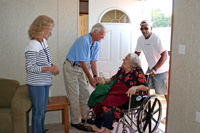Editorial
Front Page - Friday, September 24, 2010
TEMA: Special needs require special preparation for emergencies
David Laprad
 As part of National Preparedness Month in September, the Tennessee Emergency Management Association is urging all Tennesseans to take steps to ensure the safety and security of the special needs people in their care during a catastrophe. While everyone should take time before a disaster to plan for survival, people with special needs might require special preparation, the agency says.
- Photo provided
As part of National Preparedness Month in September, the Tennessee Emergency Management Association is urging all Tennesseans to take steps to ensure the safety and security of the special needs people in their care during a catastrophe. While everyone should take time before a disaster to plan for survival, people with special needs might require special preparation, the agency says.
- Photo provided
When a fire alarm sounds off at work, or the local weather bureau issues a tornado warning, or an earthquake hits without notice, people spring into action to protect themselves and those around them. In many cases, they prepared in advance to respond to the emergency. Disaster preparedness is not a “one size fits all” concept, however, as the procedures that ensure the safety of the average person during a disaster might not address the special needs of the disabled, children, or the elderly.
As part of National Pre-paredness Month in September, the Tennessee Emergency Man-agement Association is urging all Tennesseans to take steps to ensure the safety and security of the special needs people in their care during a catastrophe. While everyone should take time before a disaster to plan for survival at home, in a shelter, or elsewhere, people with special needs might require special preparation, the agency says. Therefore, TEMA would like everyone caring for a family member with a disability, a senior citizen, or a small child who requires special attention and supplies to think about the extra steps they need to add to their family’s emergency plan.
Jeremy Heidt, spokesman for TEMA, says Tennesseans could fall victim to several catastrophes.
“Tennessee experiences many kinds of natural disasters, from severe weather, to wildfires, to earthquakes. There are also many human-caused disasters, which can include the many kinds of hazardous materials incidents, such as industrial and highway accidents, as well as fires, criminal activity and terrorism.”
Flooding is the most common and likely disaster most citizens will face, Heidt says, and tornadoes can happen any time of year and impact anyone in the state, but TEMA considers an earthquake the largest and most devastating threat. The State of Tennessee has even added a Catastrophic Annex to its Emergency Management Plan that’s designed to cope with an earthquake or other massive disaster.
Heidt advises Tennesseans to follow the example of their state government and implement a disaster response plan.
“Citizens can most effectively prepare themselves by becoming familiar with the dangers their community faces and taking at least some basic steps toward family preparedness. Having a weather radio for severe weather alerts and creating a family emergency plan and a communications strategy will ensure all family members can receive adequate warning and also know what to do in the event of an emergency.”
People responsible for disabled individuals should take several steps to adequately prepare to care for the person during a disaster, TEMA says. For individuals on respirators or other electric-powered medical equipment, the agency says caregivers should check with the person’s oxygen supplier about emergency plans, and have electrical back-up for any medical equipment.
The agency also recommends maintaining a two-week supply of dressings, nasal cannulas, suction catheters and both prescription and non-prescription drugs, as well as having extra contact lenses, eyeglasses and batteries for hearing aids on hand. In addition, TEMA suggests having copies of the person’s medical records and prescriptions for medical equipment, supplies and medication readily available.
Finally, TEMA advocates making plans beforehand to have accessible transportation in case of evacuation.
People with small children should include extra items in their disaster supply kit, such as diapers, baby formula, medications, favorite books, crayons and paper, puzzles, favorite toys, a favorite blanket or pillow, pictures of family and pet, and any others items that might comfort their children.
Children’s fears that they might be separated from family, that someone will be injured or killed, or that they will end up alone frequently stem from their imagination. Therefore, communication is important in helping to maintain a child’s mental well being in times of crisis, TEMA said in a press release issued Sept. 8 titled “Special Needs Require Special Preparation.”
TEMA also recommends including a copy of the child’s immunization records, including the date of his or her last tetanus-diphtheria shot, in the disaster supply kit.
Those responsible for the care of senior citizens should remember to help the elderly who live alone, as they might need help evacuating from their home, preparing for a storm or dealing with the aftermath of a disaster.
Special considerations should also be given to the hearing impaired, the mobility impaired, single working parents, non-English speaking residents, people without vehicles and those with special dietary needs. For example, one might need to make special arrangements for the hearing impaired to receive warnings, or for the mobility impaired to have assistance getting to a shelter, or for those with special dietary needs to have an adequate emergency food supply.
Finally, TEMA says people with special needs should create a network of neighbors, relatives, friends and co-workers to aid them in an emergency, making sure everyone knows their needs and is able to operate their equipment.
For more information regarding special needs and other aspects of preparedness, visit www.ready.gov.
|
|